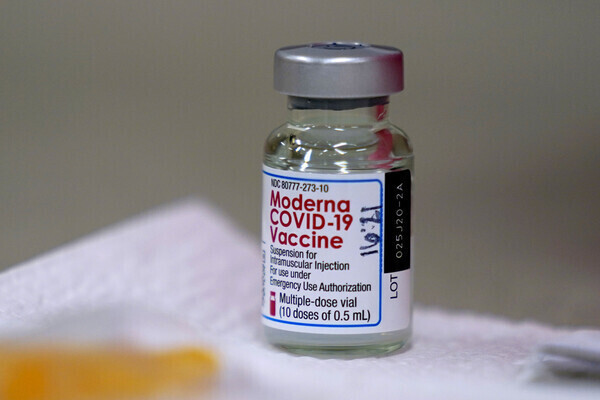hankyoreh
Links to other country sites 다른 나라 사이트 링크
Vaccine cooperation to be on agenda for S. Korea-US summit

The Blue House announced Wednesday that vaccine cooperation would be a major part of the agenda for a South Korea-US summit scheduled for next week.
Seoul appears to be continuing its preliminary discussions with Washington in the hopes of establishing a "global hub" of vaccine production for supplies throughout the world.
"One of the major agenda items for discussions at the South Korea-US summit is going to be a South Korea-US vaccine partnership," said Blue House policy chief Lee Ho-seung in an interview that day on the MBC radio program "A Closer Look with Kim Jong-bae."
"We're predicting this could be an opportunity for South Korea to flesh out its vision of becoming a global hub for vaccine production," he added. This marks the first time the Blue House has officially mentioned vaccine cooperation as an agendum for the South Korea-US summit.
Lee shared a vision for establishing a "global vaccine hub" combining US technology with South Korean production capabilities.
"The US possesses vaccine source technology and raw materials, while South Korea possesses the world's second highest-ranked biotechnology production capabilities," he said. "If we put the two of them together, South Korea can become a global hub for vaccine production."
A South Korean administration official explained, "It's a question of whether global pharmaceutical companies invest in South Korea."
"South Korea's [vaccine production] companies are highly efficient. South Korea's rate is 90% where other places are around 70%, which is why they're apparently thinking of shifting some of the [production volume] in Europe and elsewhere to South Korea," the official added.
Analysts also say the recent severe worsening of the COVID-19 situation in India, one of the main global vaccine suppliers, has been another factor behind the discussions. It further ties in with efforts by the Joe Biden administration to waive the major pharmaceutical companies' vaccine patents in an effort to "restore vaccine leadership."
The South Korean pharmaceutical industry has been closely watching developments with the "global vaccine hub" vision.
Also discussed are plans for potentially moving up the schedule for COVID-19 vaccine arrivals due to fears of a dry period during the first half of the year.
"Since we don't have enough vaccines in May and June relative to our ability to administer them, it would help with our disease control efforts if we were to receive [contracted supplies] ahead of schedule, so we're in discussions toward adjusting the timeline," Lee said.
A vaccine swap arrangement, where South Korea would acquire some of the US's current vaccine volumes and return an equivalent amount, later on, is also being considered.
"Since we don't know whether the pharmaceutical companies are going to be able to keep to the supply schedule, the idea is that we would use [the vaccines] first, with our high level of vaccine administration efficiency, and then 'pay them back' later," an administration official said.
"In the interests of vaccination efficiency, we're looking at a more comprehensive form of vaccine cooperation than simply administering [vaccines] three months ahead of schedule," the official added.
Hwang Kyo-ahn, the former leader of the United Future Party (predecessor of the current People Power Party), believes after his recent US visit that South Korean President Moon Jae-in would also visit the US to sign a deal to bring more vaccines to South Korea.
"I heard from local pharmaceutical companies and members of the US Congress that we would be concluding a large-scale vaccine contract with local pharmaceutical companies in time for President Moon's US visit," Hwang said of his recent visit.
By Lee Wan, staff reporter
Please direct comments or questions to [english@hani.co.kr]

Editorial・opinion
![[Column] Life on our Trisolaris [Column] Life on our Trisolaris](https://flexible.img.hani.co.kr/flexible/normal/500/300/imgdb/original/2024/0505/4817148682278544.jpg) [Column] Life on our Trisolaris
[Column] Life on our Trisolaris![[Editorial] Penalties for airing allegations against Korea’s first lady endanger free press [Editorial] Penalties for airing allegations against Korea’s first lady endanger free press](https://flexible.img.hani.co.kr/flexible/normal/500/300/imgdb/original/2024/0502/1817146398095106.jpg) [Editorial] Penalties for airing allegations against Korea’s first lady endanger free press
[Editorial] Penalties for airing allegations against Korea’s first lady endanger free press- [Editorial] Yoon must halt procurement of SM-3 interceptor missiles
- [Guest essay] Maybe Korea’s rapid population decline is an opportunity, not a crisis
- [Column] Can Yoon steer diplomacy with Russia, China back on track?
- [Column] Season 2 of special prosecutor probe may be coming to Korea soon
- [Column] Park Geun-hye déjà vu in Yoon Suk-yeol
- [Editorial] New weight of N. Korea’s nuclear threats makes dialogue all the more urgent
- [Guest essay] The real reason Korea’s new right wants to dub Rhee a founding father
- [Column] ‘Choson’: Is it time we start referring to N. Korea in its own terms?
Most viewed articles
- 160% of young Koreans see no need to have kids after marriage
- 2New sex-ed guidelines forbid teaching about homosexuality
- 3Presidential office warns of veto in response to opposition passing special counsel probe act
- 4[Column] Life on our Trisolaris
- 5OECD upgrades Korea’s growth forecast from 2.2% to 2.6%
- 6[Guest essay] Maybe Korea’s rapid population decline is an opportunity, not a crisis
- 7Months and months of overdue wages are pushing migrant workers in Korea into debt
- 8[Column] Can Yoon steer diplomacy with Russia, China back on track?
- 9Bills for Itaewon crush inquiry, special counsel probe into Marine’s death pass National Assembly
- 10Another chaebol heir caught smuggling liquid marijuana into South Korea